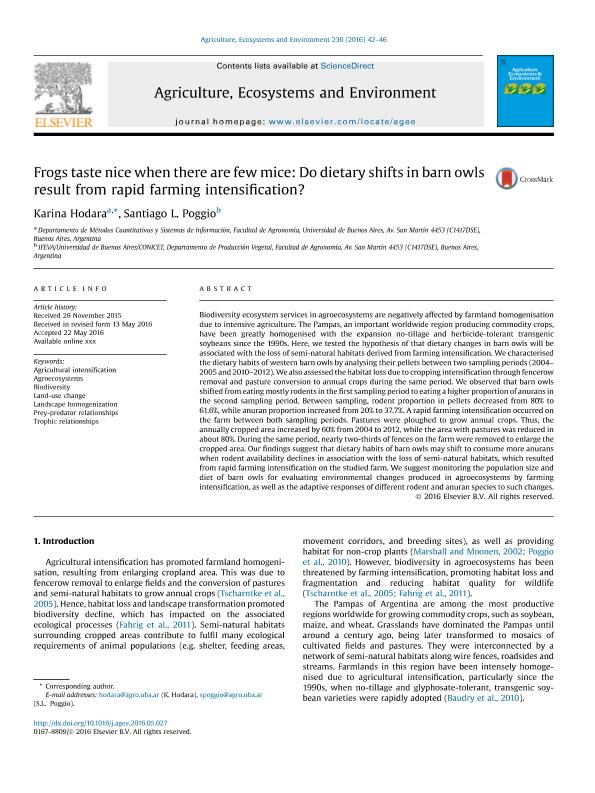Artículo
Frogs taste nice when there are few mice: Do dietary shifts in barn owls result from rapid farming intensification?
Fecha de publicación:
08/2016
Editorial:
Elsevier Science
Revista:
Agriculture, Ecosystems and Environment
ISSN:
0167-8809
Idioma:
Inglés
Tipo de recurso:
Artículo publicado
Clasificación temática:
Resumen
Biodiversity ecosystem services in agroecosystems are negatively affected by farmland homogenisation due to intensive agriculture. The Pampas, an important worldwide region producing commodity crops, have been greatly homogenised with the expansion no-tillage and herbicide-tolerant transgenic soybeans since the 1990s. Here, we tested the hypothesis of that dietary changes in barn owls will be associated with the loss of semi-natural habitats derived from farming intensification. We characterised the dietary habits of western barn owls by analysing their pellets between two sampling periods (2004-2005 and 2010-2012). We also assessed the habitat loss due to cropping intensification through fencerow removal and pasture conversion to annual crops during the same period. We observed that barn owls shifted from eating mostly rodents in the first sampling period to eating a higher proportion of anurans in the second sampling period. Between sampling, rodent proportion in pellets decreased from 80% to 61.6%, while anuran proportion increased from 20% to 37.7%. A rapid farming intensification occurred on the farm between both sampling periods. Pastures were ploughed to grow annual crops. Thus, the annually cropped area increased by 60% from 2004 to 2012, while the area with pastures was reduced in about 80%. During the same period, nearly two-thirds of fences on the farm were removed to enlarge the cropped area. Our findings suggest that dietary habits of barn owls may shift to consume more anurans when rodent availability declines in association with the loss of semi-natural habitats, which resulted from rapid farming intensification on the studied farm. We suggest monitoring the population size and diet of barn owls for evaluating environmental changes produced in agroecosystems by farming intensification, as well as the adaptive responses of different rodent and anuran species to such changes.
Archivos asociados
Licencia
Identificadores
Colecciones
Articulos(IFEVA)
Articulos de INST.D/INV.FISIOLOGICAS Y ECO.VINCULADAS A L/AGRIC
Articulos de INST.D/INV.FISIOLOGICAS Y ECO.VINCULADAS A L/AGRIC
Citación
Hodara, Karina; Poggio, Santiago Luis; Frogs taste nice when there are few mice: Do dietary shifts in barn owls result from rapid farming intensification?; Elsevier Science; Agriculture, Ecosystems and Environment; 230; 8-2016; 42-46
Compartir
Altmétricas




